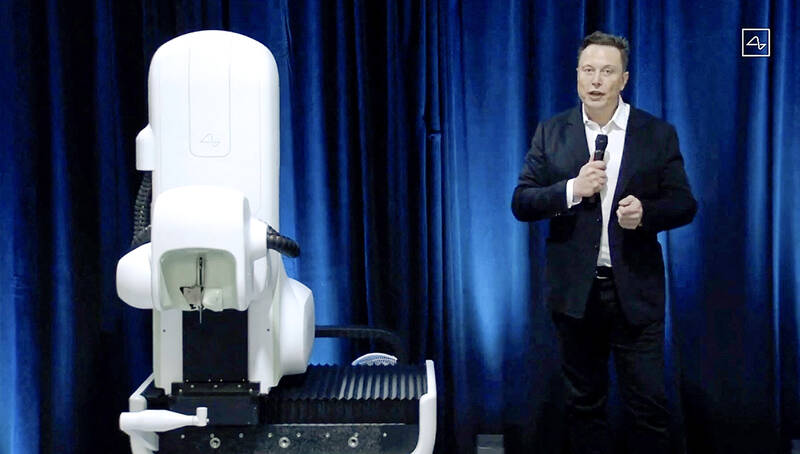Tesla Inc and Twitter Inc chief executive officer Elon Musk’s start-up Neuralink on Thursday said it has approval from US regulators to test its brain implants in people.
Neuralink said clearance from the US Food and Drug Administration (FDA) for its first in-human clinical study is “an important first step” for its technology, which is intended to let brains interface directly with computers.
“We are excited to share that we have received the FDA’s approval to launch our first in-human clinical study,” Neuralink wrote on Twitter.

Photo: AFP
Recruitment for a clinical trial is not yet open, Neuralink said.
The aim of Neuralink implants is to enable human brains to communicate directly with computers, Musk said during a presentation by the start-up in December last year.
“We’ve been working hard to be ready for our first human [implant], and obviously we want to be extremely careful and certain that it will work well before putting a device in a human,” he said at the time.
Neuralink prototypes, which are the size of a coin, have been implanted in the skulls of monkeys, demonstrations by the start-up showed.
At a presentation, Neuralink showed several monkeys “playing” basic video games or moving a cursor on a screen through their Neuralink implant.
The technology has also been tested in pigs.
Using a surgical robot, a piece of the skull is replaced with a Neuralink disk, and its wispy wires are strategically inserted into the brain, an early demonstration showed.
The disk registers nerve activity, relaying the information via common Bluetooth wireless signal to a device such as a smartphone, Musk said.
“It actually fits quite nicely in your skull,” Musk said during a presentation. “It could be under your hair and you wouldn’t know.”
Musk said the company would try to use the implants to restore vision and mobility in humans who had lost such abilities.
“We would initially enable someone who has almost no ability to operate their muscles ... and enable them to operate their phone faster than someone who has working hands,” he said.
“As miraculous as it may sound, we are confident that it is possible to restore full body functionality to someone who has a severed spinal cord,” he said.
Beyond the potential to treat neurological diseases, Musk said his goal is to ensure that humans are not intellectually overwhelmed by artificial intelligence.
Other companies working on similar systems include Synchron, which announced in July last year that it had implanted the first human brain-machine interface in the US.
Members of the Neuralink team have shared a “wish list” that ranged from technology returning mobility to paralyzed people and sight to the blind, to the uploading of memories for later reference — or to be downloaded into replacement bodies.

MAKING WAVES: China’s maritime militia could become a nontraditional threat in war, clogging up shipping lanes to prevent US or Japanese intervention, a report said About 1,900 Chinese ships flying flags of convenience and fishing vessels that participated in China’s military exercises around Taiwan last month and in January last year have been listed for monitoring, Coast Guard Administration (CGA) Deputy Director-General Hsieh Ching-chin (謝慶欽) said yesterday. Following amendments to the Commercial Port Act (商港法) and the Law of Ships (船舶法) last month, the CGA can designate possible berthing areas or deny ports of call for vessels suspected of loitering around areas where undersea cables can be accessed, Oceans Affairs Council Minister Kuan Bi-ling (管碧玲) said. The list of suspected ships, originally 300, had risen to about

DAREDEVIL: Honnold said it had always been a dream of his to climb Taipei 101, while a Netflix producer said the skyscraper was ‘a real icon of this country’ US climber Alex Honnold yesterday took on Taiwan’s tallest building, becoming the first person to scale Taipei 101 without a rope, harness or safety net. Hundreds of spectators gathered at the base of the 101-story skyscraper to watch Honnold, 40, embark on his daredevil feat, which was also broadcast live on Netflix. Dressed in a red T-shirt and yellow custom-made climbing shoes, Honnold swiftly moved up the southeast face of the glass and steel building. At one point, he stepped onto a platform midway up to wave down at fans and onlookers who were taking photos. People watching from inside

Japan’s strategic alliance with the US would collapse if Tokyo were to turn away from a conflict in Taiwan, Japanese Prime Minister Sanae Takaichi said yesterday, but distanced herself from previous comments that suggested a possible military response in such an event. Takaichi expressed her latest views on a nationally broadcast TV program late on Monday, where an opposition party leader criticized her for igniting tensions with China with the earlier remarks. Ties between Japan and China have sunk to the worst level in years after Takaichi said in November that a hypothetical Chinese attack on Taiwan could bring about a Japanese

STREAMLINED: The dedicated funding would allow the US to transfer equipment to Taiwan when needed and order upgraded replacements for stockpiles, a source said The US House of Representatives on Thursday passed a defense appropriations bill totaling US$838.7 billion, of which US$1 billion is to be allocated to reinforcing security cooperation with Taiwan and US$150 million to replace defense articles provided to the nation. These are part of the Consolidated Appropriation Act, which the US House yesterday passed with 341 votes in favor and 88 against. The act must be passed by the US Senate before Friday next week to avoid another government shutdown. The US House Committee on Appropriations on Monday unveiled the act, saying that it allocates US$1 billion for the Taiwan Security Cooperation Initiative